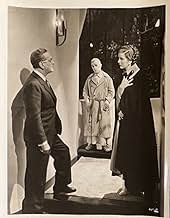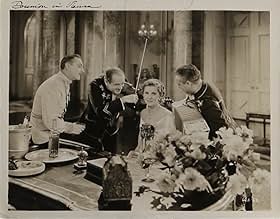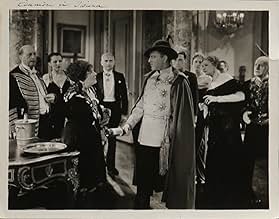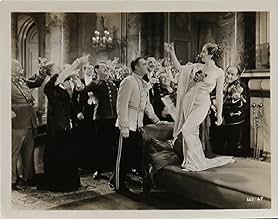An archduke who had been banished from Austria returns to Vienna for a reunion of his old fellow aristocrats and meets up with the former love of his life, who is now married to a psychoanal... Read allAn archduke who had been banished from Austria returns to Vienna for a reunion of his old fellow aristocrats and meets up with the former love of his life, who is now married to a psychoanalyst.An archduke who had been banished from Austria returns to Vienna for a reunion of his old fellow aristocrats and meets up with the former love of his life, who is now married to a psychoanalyst.
- Director
- Writers
- Stars
- Nominated for 1 Oscar
- 3 wins & 1 nomination total
Morris Ankrum
- Musician
- (uncredited)
Symona Boniface
- Noblewoman
- (uncredited)
John Davidson
- Police Officer
- (uncredited)
George Davis
- Waiter
- (uncredited)
Ferdinand Gottschalk
- Palace Tour Guide
- (uncredited)
Tenen Holtz
- Tourist with Drapes
- (uncredited)
- Director
- Writers
- All cast & crew
- Production, box office & more at IMDbPro
Featured reviews
John Barrymore as a Habsburg Archduke reduced to driving a hack, fifteen years after "the Revolution," towers over this rarely shown movie that had a welcome screening at the Museum of Modern Art in New York today. Other pleasures included seeing familiar actors playing against type: Eduardo Ciannelli as the sweet and loyal former valet of the Archduke, Henry Travers as Frank Morgan's dotty but perspicacious father, May Robson as a crude, cigar-chomping hotelier with a heart of gold and red drawers. The premise that the love of one's life can return and the affair will resume even decades later is examined wittily and touchingly in this cinematic version of Robert E. Sherwood's play. The former lovers, Barrymore and Diana Wynyard, are funny, sexy and heartbreaking. Frank Morgan, as the husband, is fine in a thankless role. And the music which contributes to the emotionality of the work is terrific. This little-known film deserves to be released on DVD.
I must admit till last night while searching through a list of movies on line. I found this one that I had not heard of before. But, with a good looking cast in it, I thought I would give it a try. And I'm so glad I did because this movie from 1933 really is something of a forgotten treasure.
John Barrymore's larger than life portrayal of the banished Archduke Rudolf from Austria, now reduced to driving a taxi, is a scintillating performance by any standards.
I have seen quite a few of Barrymore's movies now and he has never disappointed me, and this one is definitely one of his most memorable.
Diana Wynyard is radiantly beautiful as Elena Krug, Rudolf's former love who is now married to a famous psychoanalyst played by Frank Morgan. Barrymore and Wynyard have great chemistry together. But the real surprise for me was Frank Morgan giving a wonderfully deft and understated performance.
The movie takes us through a variety of emotions all of which are played out beautifully. It really is a wonderful movie, and from somebody who is very hard please when it comes to films, I highly recommend this one as a glorious piece of old fashioned movie entertainment.
John Barrymore's larger than life portrayal of the banished Archduke Rudolf from Austria, now reduced to driving a taxi, is a scintillating performance by any standards.
I have seen quite a few of Barrymore's movies now and he has never disappointed me, and this one is definitely one of his most memorable.
Diana Wynyard is radiantly beautiful as Elena Krug, Rudolf's former love who is now married to a famous psychoanalyst played by Frank Morgan. Barrymore and Wynyard have great chemistry together. But the real surprise for me was Frank Morgan giving a wonderfully deft and understated performance.
The movie takes us through a variety of emotions all of which are played out beautifully. It really is a wonderful movie, and from somebody who is very hard please when it comes to films, I highly recommend this one as a glorious piece of old fashioned movie entertainment.
The first fifteen minutes of Reunion in Vienna is confusing, but compared to the rest of the movie, it's much better. Diana Wynyard is shows attending a tour of a grand Viennese palace, and she slips away from the rest of the group and imagines herself in a royal gown meeting the prince from long ago. Then, at home, she's bored with her husband Frank Morgan and father-in-law Henry Travers. It makes the audience think the movie is a fantasy about a bored housewife who wishes she could meet a prince.
Instead, the prince is not only real, but he's her ex-boyfriend. He was exiled after a change of power, and then Diana married Frank. Frank is a famous psychologist who carries the theory to his patients, including Una Merkel, that a woman's first love is glorified in her mind and that if she saw him again as he was, he'd topple from his pedestal. So, putting his money where his mouth is, Frank tells Diana to go to May Robson's party because he knows Prince John Barrymore will be in attendance. He believes she'll come running home with open arms. However, as soon as John graces the screen, he slows the tempo down and makes everyone think they're watching him onstage. His performance is very exaggerated, and he and Diana don't seem to have any shared history that would make her doubt her happiness at home.
This story isn't very interesting, since the majority of the movie tries to show tension between Diana and John, rather than the psychology behind Frank's theory. No one is at his or her best acting, so if you're a fan of the cast, try renting one of their other movies tonight.
Instead, the prince is not only real, but he's her ex-boyfriend. He was exiled after a change of power, and then Diana married Frank. Frank is a famous psychologist who carries the theory to his patients, including Una Merkel, that a woman's first love is glorified in her mind and that if she saw him again as he was, he'd topple from his pedestal. So, putting his money where his mouth is, Frank tells Diana to go to May Robson's party because he knows Prince John Barrymore will be in attendance. He believes she'll come running home with open arms. However, as soon as John graces the screen, he slows the tempo down and makes everyone think they're watching him onstage. His performance is very exaggerated, and he and Diana don't seem to have any shared history that would make her doubt her happiness at home.
This story isn't very interesting, since the majority of the movie tries to show tension between Diana and John, rather than the psychology behind Frank's theory. No one is at his or her best acting, so if you're a fan of the cast, try renting one of their other movies tonight.
John Barrymore is perfectly cast as the fallen Habsburg prince, Rudolf, reduced to making a living as a taxicab driver by the fortunes of war and the fall of the empire. Barrymore brings to this role the perfect mix of tragedy, bathos, and comic self-deprecation. Diana Wynyard is entirely believable as his erstwhile lover dissatisfied with the clinical attentions of her psychiatrist husband, Frank Morgan, and longing for the lost days at Schoenbrun. Eduardo Cianelli, Henry Travers, Una Merkle, and May Robson round out the ensemble cast in this highly enjoyable period piece. Sadly, as Diana Wynyard's character finds, we all have to live in the present.
I do NOT care for John Barrymore. He is always a cocky cad (usually drunk) and he thinks he is a great lover. I don't know how the leading actresses fall for such a character.
But Diana Wynyard and Frank Morgan are both great in this film. I loved Wynyard when she was in "Men Must Fight" earlier this year (1933). She plays difficult roles naturally and convincingly. I understand this is a role she created in the stage version also before it became a film.
Frank Morgan is great as her husband who supports his wife and believes in her even when he knows she might be heading in to trouble.
The film is long but the theme is very clear: You can remember the past and have fond memories of another life, but you can't live in the past. You can ONLY live in the present and live for the future.
Wynyard served on the royal court and was Barrymore's favorite courtesan. The Austrian royal family was banished and Barrymore lost his spoiled and privileged position. While Wynyard misses those days, she has moved on and is happy with Morgan. Barrymore has not moved on and still thinks he is the same spoiled careless royal he was. He assumes this means he can take up with Wynyard anytime he wants.
You can see the longing and sadness in Wynyard's character as she is torn between the present and the past. The past was wonderful, but it is over. Or is it?
Strong characters. Intriguing situations. And a study in how time moves on. It really has no choice.
So check out this classic and remember not to live in the past. Look at it but don't live in it. Keep the present classy!
But Diana Wynyard and Frank Morgan are both great in this film. I loved Wynyard when she was in "Men Must Fight" earlier this year (1933). She plays difficult roles naturally and convincingly. I understand this is a role she created in the stage version also before it became a film.
Frank Morgan is great as her husband who supports his wife and believes in her even when he knows she might be heading in to trouble.
The film is long but the theme is very clear: You can remember the past and have fond memories of another life, but you can't live in the past. You can ONLY live in the present and live for the future.
Wynyard served on the royal court and was Barrymore's favorite courtesan. The Austrian royal family was banished and Barrymore lost his spoiled and privileged position. While Wynyard misses those days, she has moved on and is happy with Morgan. Barrymore has not moved on and still thinks he is the same spoiled careless royal he was. He assumes this means he can take up with Wynyard anytime he wants.
You can see the longing and sadness in Wynyard's character as she is torn between the present and the past. The past was wonderful, but it is over. Or is it?
Strong characters. Intriguing situations. And a study in how time moves on. It really has no choice.
So check out this classic and remember not to live in the past. Look at it but don't live in it. Keep the present classy!
Did you know
- TriviaThis film was included in the original MGM feature film package first released to television in late 1956. It was first telecast in Los Angeles Thursday 25 April 1957 on KTTV (Channel 11); it first aired in Hartford CT 4 June 1957 on WHCT (Channel 18, in Miami 15 June 1957 on WCKT (Channel 7), in Minneapolis 29 June 1957 on KMGM (Channel 9), in Seattle 24 July 1957 on KING (Channel 5), in New York City 26 August 1957 on WCBS (Channel 2), in Portland OR 31 August 1957 on KGW (Channel 8), in Norfolk VA 24 November 1957 on WTAR (Channel 3), in Honolulu 3 December 1957 on KHVH (Channel 13), in Akron 31 December 1957 on WAKR (Channel 49), and in Peoria 9 January 1958 on WTVH (Channel 19). In Philadelphia it was Initially telecast 13 May 1958 on WFIL (Channel 6), and in San Francisco 13 March 1959 on KGO (Channel 7),; it was also shown during this period on most of the other many stations who had contracted for this MGM series. It was last telecast on cable TV on Showtime in August 1985. Since that time, legal complications involving rights problems arose, and it was withdrawn from public exhibition. Presently, it's in the TCM library, but has yet to be shown, or released on DVD, because of this situation.
- ConnectionsReferenced in Hollywood Hist-o-Rama: John Barrymore (1962)
Details
- Release date
- Country of origin
- Languages
- Also known as
- Valse d'amour
- Filming locations
- Production company
- See more company credits at IMDbPro
- Runtime
- 1h 38m(98 min)
- Color
- Aspect ratio
- 1.37 : 1
Contribute to this page
Suggest an edit or add missing content


























